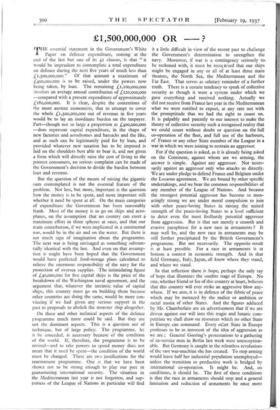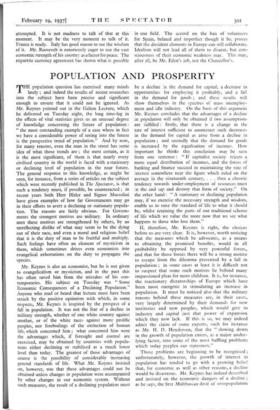£1,500,000,000 OR
THE essential statement in the Government's White Paper on defence expenditure, coming at the end of the last but one of its 42 clauses, is that "it would be imprudent to contemplate a total expenditure on defence during the next five years of much less than ki,sco,000,000." Of that amount a maximum of £400,000,000 is to be raised, under the powers now being taken, by loan. The remaining LI,Ioo,000,000 involves an average annual contribution of £220,000,000 —compared with a present expenditure of approximately kr8o,000,000. It is clear, despite the contentions of the more austere economists, that to attempt to cover the whole L1,500,000,000 out of revenue in five years would be to lay an inordinate burden on the taxpayer. Part—though not so large a proportion as £400,00o,000 —does represent capital expenditure, in the shape of new factories and aerodromes and barracks and the like, and as such can be legitimately paid for by loan, and provided whatever new taxation has to be imposed is laid on the shoulders best able to bear it, and not given a form which will directly raise the cost of living to the poorest consumers, no serious complaint can be made of the Government's decision to divide the burden between Joan and revenue.
But the question of the means of raising the gigantic sum contemplated is not the essential feature of the problem. Not less, but more, important is the question how the money is to be spent, and more important still whether it need be spent at all. On the main categories of expenditure the Government has been reasonably frank. Most of the money is to go on ships and aero- planes, on the assumption that no country can exert a maximum effort in three spheres at once, and that our main contribution, if we were implicated in a continental war, would be in the air and on the water. But there is not much sign of imagination about the programme. The next war is being envisaged as something substan- tially identical with the last. And even on that assump- tion it might have been hoped that the Government would have perfected food-storage plans calculated to relieve the enormous responsibility of the navy for the protection of oversea supplies. The intimidating figure of £40,000,000 for five capital ships is the price of the breakdown of the Washington naval agreement, and the argument that, whatever the intrinsic value of capital ships, this country must go on building them because other countries are doing the same, would be more con- vincing if we had given any serious support in the past to proposals to abolish the monster ship altogether.
On these and other technical aspects of the defence programme much more could be said. But they are not the dominant aspects. This is a question not of technique, but of large policy. The programme, let it be conceded, is necessary because of the condition of the world. If, therefore, the programme is to be revised—and to take powers to spend money does not mean that it need be spent—the condition of the world must be changed. There are two justifications for the rearmament programme. One is that we have been shown not to be strong enough to play our part in guaranteeing international security. The situation in the Mediterranean last year is not forgotten, and sup- porters of the League of Nations in particular will find it a little difficult in view of the recent past to challenge the Government's determination to strengthen the navy. Moreover, if war is a contingency seriously to.
be reckoned with, it must be recognised that our ships might be engaged in any or all of at least three main theatres, the North Sea, the Mediterranean and the Far East. That serves as salutary reminder of a further truth. There is a certain tendency to speak of collective security as though it were a system under which we gave everything and received nothing. Actually we did not receive from France last year in the Mediterranean what we were entitled to expect, at any rate not with the promptitude that we had the right to count on.
It is palpably and patently to our interest to make the theory of collective security such a recognised reality that we could count without doubt or question on the full co-operation of the fleet, and full use of the harbours, of France or any other State member of the League in a war in which we were joining to restrain an aggressor.
For if the question is asked, as it is already being asked on the Continent, against whom are we arming, the answer is simple. Against any aggressor. Not neces- sarily against an aggressor only who attacks us directly. We are under pledge to defend France and Belgium under the Locarno agreement. We are bound by other specific undertakings, and we bear the common responsibilities of any member of the League of Nations. And because the strongest potential aggressor has become so men- acingly strong we are under moral compulsion to join with other peace-loving States in raising the united strength of the peace-loving States to a level sufficient to deter even the most foolhardy potential aggressor from aggression. But is that not merely a smooth and evasive paraphrase for a new race in armaments ? It may well be, and the new race in armaments may be still further precipitated by the British Government's programme. But not necessarily. The opposite result is at least possible. For a race in armaments is at bottom a contest in economic strength. And in that field Germany, Italy, Japan, all know where they stand, and where we stand.
In that reflection there is hope, perhaps the only ray of hope that illumines the sombre stage of Europe. No one, whether friend or foe of this country at heart, believes that this country will ever strike an aggressive blow any- where. - If we arm, it is in defence of the fabric of peace which may be menaced by the malice or ambition or racial mania of other States. And the figures adduced by Mr. Chamberlain are an advertisement that if we are driven against our will into this tragic and lunatic com- petition we shall draw on resources which no other State in Europe can command. Every other State in Europe professes to be as innocent of the idea of aggression as we are ; General Goering's protestations to a gathering of ex-service men in Berlin last week were unexception- able. But Germany is caught in the relentless revolutions of the vast war-machine she has created. To stop arming would leave half her industrial population unemployed— unless the transition to productive work is bridged by international co-operation. It might be. And, on conditions, it should be. The first of those conditions is that the race in armaments should stop and a general limitation and reduction of armaments be once more attempted. It is not madness to talk of that at this moment. It may be the very moment to talk of it. France is ready. Italy has good reason to see the wisdom of it. Mr. Roosevelt is notoriously eager to use the vast economic strength of his country as a factor for peace. The tripartite currency agreement has shown what is possible in one field. The accord on the ban of volunteers for Spain, belated and imperfect though it be, proves that the dissident elements in Europe can still collaborate. Idealism will not lead all of them to disarm, but con- sciousness of their economic weakness may. This may, after all, be Mr. Eden's job, not the Chancellor's.















































 Previous page
Previous page